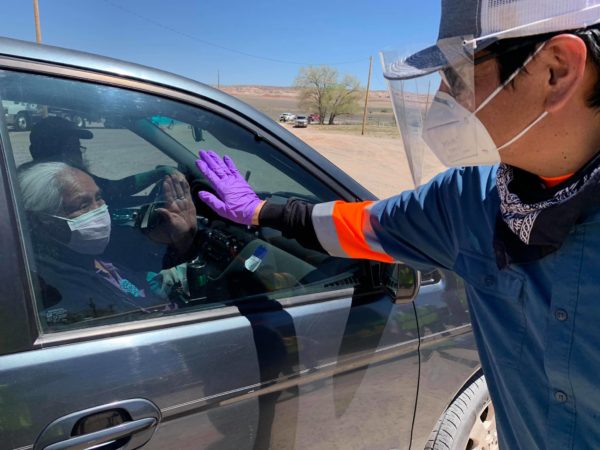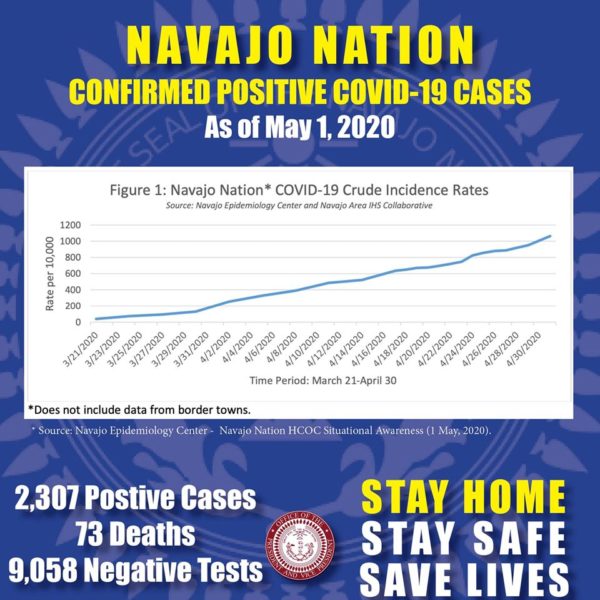
- Details
- By Levi Rickert
WINDOW ROCK, Ariz. — The number of COVID-19 cases rose by 163 on Friday on the Navajo Nation, which brings the total number of cases to 2,307.
Two more novel coronavirus related deaths were reported. The death toll now stands at 73.
On Friday, the Navajo Department of Health in coordination with the Navajo Epidemiology Center and the Navajo Area Indian Health Service says a total of 13,427 COVID-19 tests have been administered with 9,058 negative test results.
The 2,307 confirmed positive cases on the Navajo Nation include the following counties:
- McKinley County, NM: 617
- Apache County, AZ: 538
- Navajo County, AZ: 513
- Coconino County, AZ: 286
- San Juan County, NM: 245
- San Juan County, UT: 42
- Socorro County, NM: 23
- Cibola County, NM: 22
- Sandoval County, NM: 21
“The Navajo Nation continues to move up the curve on the number of positive cases and deaths. Last week, we began to see a slight flattening of the curve, but so many people continue to travel to border towns and now we’re seeing spikes in new cases again. We, as citizens of the Navajo Nation, need to do a better job and hold one another accountable. As leaders, we send a message of hope, resilience, and strength to our Navajo citizens, because we believe that we will overcome this pandemic together and stronger. We also continue for pray for all of the families that become victims of the virus,” Navajo Nation President Jonathan Nez said.

He added, “We are seeing more positive cases because there is a lot more testing being conducted in each county. Those who test positive will soon be able to isolate themselves at one of the Alternative Care Sites and this will help to prevent the spread among families and communities. Let’s be strong and keep fighting together by staying home and avoiding hotshot areas."
The Navajo Nation’s 57-hour weekend curfew is in effect, requiring all residents to remain home with the exception of essential workers, including first responders, and in cases of emergencies. The Navajo Police will setup road checkpoints and issue citations to curfew violators as well.
______________________________________________________
To Donate to the Navajo Nation
The official webpage for donations to the Navajo Nation, which has further details on how to support the Nation’s Dikos Ntsaaígíí-19 (COVID-19) efforts is: http://www.nndoh.org/donate.html.
_________________________________________________________________
For More Information
For more information including reports, helpful prevention tips, and more resources, please visit the Navajo Department of Health’s COVID-19 website at http://www.ndoh.navajo-nsn.
For up to date information on impact the coronavirus pandemic is having in the United States and around the world go to: https://www.worldometers.info/coronavirus/country/us/?
More Stories Like This
Native News Weekly (August 25, 2024): D.C. BriefsUS Presidents in Their Own Words Concerning American Indians
Native News Weekly (December 14, 2025): D.C. Briefs
Wounded Knee Massacre Site Protection Bill Passes Congress
Two Murdered on Colville Indian Reservation
Help us defend tribal sovereignty.
At Native News Online, our mission is rooted in telling the stories that strengthen sovereignty and uplift Indigenous voices — not just at year’s end, but every single day.
Because of your generosity last year, we were able to keep our reporters on the ground in tribal communities, at national gatherings and in the halls of Congress — covering the issues that matter most to Indian Country: sovereignty, culture, education, health and economic opportunity.
That support sustained us through a tough year in 2025. Now, as we look to the year ahead, we need your help right now to ensure warrior journalism remains strong — reporting that defends tribal sovereignty, amplifies Native truth, and holds power accountable.
 The stakes couldn't be higher. Your support keeps Native voices heard, Native stories told and Native sovereignty defended.
The stakes couldn't be higher. Your support keeps Native voices heard, Native stories told and Native sovereignty defended.
Stand with Warrior Journalism today.
Levi Rickert (Potawatomi), Editor & Publisher

